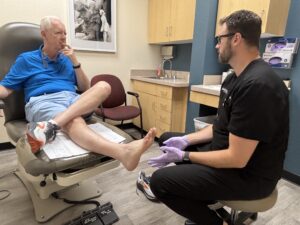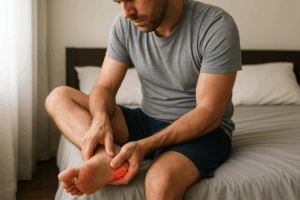Foot Care Tips for Individuals with Diabetes
Living with diabetes requires special attention to your health, and that includes foot care. Diabetes can lead to various foot problems, often due to two main complications of the disease: nerve damage (neuropathy) and poor circulation. In this article, we’ll explore some specialized advice for individuals with diabetes on maintaining foot health, recognizing signs of potential problems, and knowing when to seek medical attention.

Understanding the Impact of Diabetes on Foot Health
Diabetes can cause decreased blood flow to your feet, making it harder for wounds to heal. Nerve damage can decrease sensation, leading to injuries going unnoticed. These factors significantly increase the risk of developing foot ulcers and infections, which can lead to serious complications if not addressed promptly.
Essential Diabetic Foot Care Tips
- Regular Foot Checks: Incorporate daily foot inspections into your routine. Look for cuts, blisters, red spots, swelling, or nail problems. Use a mirror or ask for help if you have trouble seeing the soles of your feet.
- Keep Your Feet Clean and Dry: Wash your feet daily in lukewarm (not hot) water and dry them gently, especially between the toes. This can help prevent fungal infections.
- Moisturize Your Feet: Apply a moisturizer to prevent dry and cracked skin, but avoid applying it between your toes as this can create a moist environment that fosters fungal growth.
- Trim Your Nails Carefully: Cut your toenails straight across and file the edges to prevent ingrown toenails.
- Protect Your Feet: Never go barefoot, even indoors, to avoid injury. Wear clean, dry socks and properly fitting shoes. Consider shoes designed specifically for individuals with diabetes.
- Promote Blood Flow to Your Feet: Keep your feet elevated when sitting, wiggle your toes, and rotate your ankles a few times a day. Avoid crossing your legs for long periods.
When to Seek Medical Attention
If you notice any of the following, contact a healthcare professional immediately:
- Changes in skin color or temperature
- Swelling in the foot or ankle
- Pain in the legs
- Open sores on the feet that are slow to heal
- Ingrown toenails or toenails infected with fungus
- Dry cracks in the skin, especially around the heel
Concluding Thoughts
Effective foot care is a critical part of managing diabetes. Regular check-ups with your healthcare provider can also help prevent complications and ensure that you’re on the right track with your foot care regimen.
If you have diabetes and have any concerns about your foot health, please contact our Gilbert, AZ office at (480) 497-3946 to set up an appointment. It’s always better to address potential issues promptly, rather than waiting for them to develop into significant problems. Your feet are an important part of your overall health—let’s keep them in good shape together.





